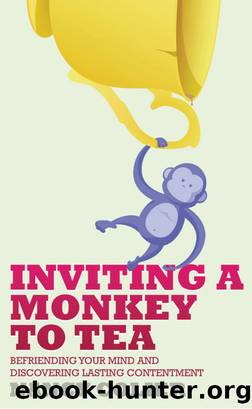Inviting a Monkey to Tea by Nancy Colier

Author:Nancy Colier
Language: eng
Format: epub
Tags: depression, happiness, buddhism, mindfulness, meditation, anxiety, advaita, nonduality, wellbeing, nancy colier
Publisher: Books We Live by
5. WELL-BEING: A RELATIONSHIP WITH OURSELVES
In Chinese philosophy, Tao is the word used for the absolute principle underlying the universe. The Tao combines within itself the principles of yin and yang and signifies the way or code of behavior that is in harmony with the natural order. It is said that the Tao that can be spoken is not the Tao. The words used to describe this way of behaving are only pointers, leading us to an experience of wholeness and well-being. The same can be said about well-being. All words we use to describe well-being are doomed. The essence of well-being cannot be captured by language. When turned into a concept or idea, it is corrupted and loses its essence; it becomes something other than what it is. Well-being itself can only be experienced and we know it when we are living it.
While we cannot adequately capture well-being with language, we can use words to describe what well-being feels like and what it does not. We can identify some primary ingredients in its fragrance. Websterâs dictionary lists well-being as âthe state or condition of being in good mental or physical health.â Happiness, on the other hand, is defined as âshowing or feeling pleasure or contentment.â This was a good foundation from which to explore further.
Asking people from all walks of life, I requested a word or two to capture the two experiences. From the field:
Well-being is health, balance, wholeness, peace, alignment, calm, okay-ness, grounded, deep, integrated, good, centered, breathing, still, compassion, not trying, not anxious, what is-ness, strength, thriving, heartiness, robust, potential, lasting, present, being.
Happiness is excitement, pleasure, delight, success, fun, positive, short-lived, sparkle, elusive, elation, energized, pleasing, right now, happening, want, desire, yes, more.
Some preferred analogies. âHappiness is a purple rose. Well- being is an oak tree.â âHappiness is a single saxophoneâs high G. Well-being is the full orchestraâs middle Câ (from a musician). âHappiness is a raspberry tart. Well-being is the feeling we have after a wonderful meal with good company.â âHappiness is chick lit. Well-being is The Odyssey.â From a mom, âHappiness is my daughterâs giggle when she feels the tickle of the toothbrush on her tongue. Well-being is the place in my heart where she resides.â
Clearly, well-being is different than happiness. Well-being can exist when we are not happy. It is not dependent upon our current circumstances. It is a presence that sits below the contents of our life, one that can remain steady throughout unstable conditions. Well-being is not transitory or elusive, but rather constant and reliable. It is the eternal now rather than the right now. It is the ocean out of which the waves of happiness and un-happiness arise. Well- being is a way of being as opposed to a way of doing, a state that we feel in our bodies and spirits, not something we know in our heads.
When we are well, we feel calm and unafraid. We can be in a friendly relationship with whatever experience is happening within us, even if it is painfulâwithout the threat of it destroying us.
Download
This site does not store any files on its server. We only index and link to content provided by other sites. Please contact the content providers to delete copyright contents if any and email us, we'll remove relevant links or contents immediately.
The Power of Now: A Guide to Spiritual Enlightenment by Eckhart Tolle(4763)
The Miracle Morning by Hal Elrod(3918)
Rising Strong by Brene Brown(3786)
Being Aware of Being Aware by Rupert Spira(2710)
The Secrets to Charisma and Personal Magnetism: Learn a hidden energy tradition to become magnetically attractive and vitally alive by Martins Bruno(2406)
The Lost Art of Good Conversation by Sakyong Mipham(2128)
The Gifts of Imperfection by Brene Brown(2120)
The Songlines by Bruce Chatwin(2114)
A New Earth: Awakening to Your Life's Purpose by Eckhart Tolle(1978)
The Power Of Now by Eckhart Tolle(1862)
All Things New by John Eldredge(1785)
The Untethered Soul: The Journey Beyond Yourself by Singer Michael A(1730)
The Nature of Consciousness by Rupert Spira(1692)
The Empath's Survival Guide by Judith Orloff(1666)
Thoughts Without A Thinker: Psychotherapy from a Buddhist Perspective by Epstein Mark(1594)
Practicing the Power of Now by Tolle Eckhart(1556)
The Seat of the Soul by Gary Zukav(1552)
Be Feel Think Do by Anne Berube(1538)
The Yoga of Jesus: Understanding the Hidden Teachings of the Gospels by Paramahansa Yogananda(1532)
